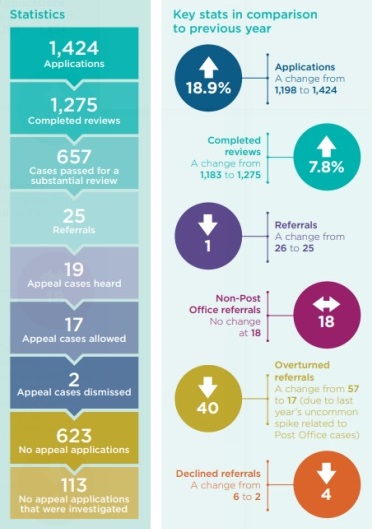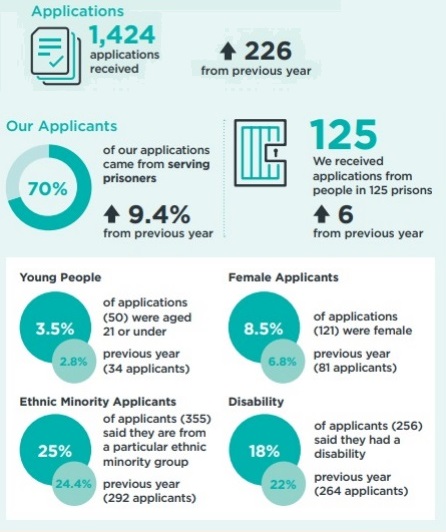Almost 20% rise in miscarriage of justice claims in the last year
- The Criminal Cases Review Commission have seen an 18.9% rise in applications (1,198 to 1,424)
- Significant rise in applications from usually under-represented groups, including women
- 25 cases were referred by the CCRC last year, including six people convicted of murder
THE organisation that independently investigates potential miscarriages of justice in England, Wales and Northern Ireland has handled an almost 20% rise in applications in the last year.
The Criminal Cases Review Commission (CCRC) received 1,424 applications between April 1 2022 and March 31 2023 from people wanting their conviction or sentence to be reviewed – an increase of 226 cases from last year, its Annual Report and Accounts revealed today (Tuesday, July 18).
The Annual Report shows that even though the body completed 7.8% more reviews than in the previous year (1,183 to 1,275), the backlog of cases still under review at the end of the financial year grew significantly from 605 to 718.
In the last year, 25 cases were referred back to the courts – including six people with independent murder convictions – and 17 convictions or sentences were overturned following CCRC referrals. The referral rate was consistent with the historical average of around 2% of all applications.
CCRC Chairman Helen Pitcher OBE said:
“This has been another challenging year with applications on the rise and recruitment and retention a key issue.
“I’m proud of my team, their hard work, dedication and total commitment to our core purpose of uncovering and referring miscarriages of justice.
“I look forward to another year of challenge and development for all at the CCRC.”
The CCRC keeps track of how closely applications reflect the demographics of people convicted of crimes and the prison population, and adjusts applicant engagement work to counter any potential under-representation of certain groups of people.
An enhanced period of applicant outreach work – including giving training to prison and charity staff and improvements to the CCRC’s website – has resulted in significantly more applications received from traditionally under-represented groups.
In addition to raw numbers increasing in almost every demographic including male (908 to 1,051) and white (587 to 738) applicants, the proportion of applications made to the CCRC from:
- women has risen from 6.8% to 8.5% (81 to 121 people)
- people aged under 25 has risen from 8.3% to 9.4% (99 to 134 people)
- those with literacy issues has risen from 11.3% to 17.9% (135 to 255 people)
- people from an ethnic minority has risen from 24.4% to 25.0% (292 to 355 people)
However, there is still work to be done in a number of areas. While increasing significantly this year, people aged 16-25 represent around 12% of the population but only account for 9.4% of CCRC applicants.
Further work will be done on social media, with youth charities and with young offenders’ institutions to train staff to signpost potential young applicants to the CCRC’s work.
The CCRC’s outreach team will also focus on engaging with potential Gypsy and Irish Travelling applicants, who currently account for 1% of the CCRC’s intake despite representing around 3% of the prison population.
CCRC Chief Executive Karen Kneller said:
“Last year we talked about the need for us as an organisation to extend our reach and ensure that all of those who might benefit from our services know about us – and can access us.
“Our application rate has now increased to pre-Covid levels and beyond, but we remain concerned there are sectors who rarely apply to us, and we will be doing some scoping work to see what we can do to reach these groups.
“It might seem counter-intuitive to carry out engagement which might increase applications we are under pressure to manage the cases we already have, but it would be wrong to shy away from encouraging applications from those who we might be able to help.”
Transparency is a key objective for the CCRC, and the report outlines key performance indicators against their target as well as the year-on-year change since the last report.
The report details ten examples of CCRC casework in the last 12 months, including the referrals of:
- Andrew Malkinson’s rape conviction following a comprehensive forensic strategy into the evidence that led to him spending 17 years in prison.
- Oliver Campbell’s murder conviction after experts concluded this vulnerabilities were not understood at the time of the charges and that he may have given unreliable evidence.
- A further seven Post Office Horizon referrals – taking the total number to 66 convictions being sent back to the courts, making it the most widespread miscarriage of justice the CCRC has investigated.
- Multiple people who were victims of human trafficking and modern slavery, who should have never been prosecuted for actions committed due to being trafficked.
- Members of the Putney Young Liberals who were convicted of charges related to blocking the England rugby union team coach from leaving to a tour in apartheid South Africa despite the court not knowing one defendant was an undercover police officer.
[ENDS]
This press release was issued by the Communications Team, Criminal Cases Review Commission. Tel: 0121 232 0900, email: press@ccrc.gov.uk.
Infographics
Notes to Editors
- You can read the CCRC’s Annual Report here. This includes the full list of referrals and decisions on CCRC referrals between April 1 2022 and March 31 2023.
- The CCRC is an independent body set up under the Criminal Appeal Act 1995. It is responsible for independently reviewing suspected and alleged miscarriages of criminal justice in England, Wales and Northern Ireland. It is based in Birmingham and is funded by the Ministry of Justice.
- There are currently 11 Commissioners who bring to the CCRC considerable experience from a wide variety of backgrounds. Commissioners are appointed by the monarch on the recommendation of the Prime Minister in accordance with the Office for the Commissioner for Public Appointments’ Code of Practice.
- The CCRC considers whether, as a result of new evidence or argument, there is a real possibility that the conviction would not be upheld were a reference to be made. New evidence or argument is argument or evidence which has not been raised during the trial or on appeal. Applicants should usually have appealed first. A case can be referred in the absence of new evidence or argument or an earlier appeal only if there are “exceptional circumstances”.
- If a case is referred, it is then for the appeal court to decide whether the conviction is unsafe or the sentence unfair.
- More details about the role and work of the Criminal Cases Review Commission can be found at www.ccrc.gov.uk. The CCRC can be found on Twitter @ccrcupdate and Instagram the_ccrc


